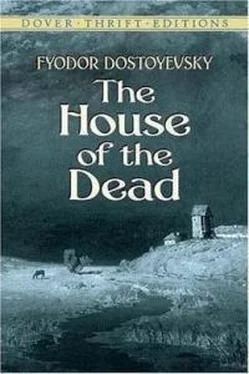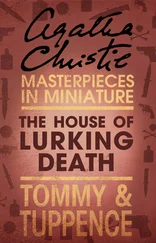Федор Достоевский - The House of the Dead
Здесь есть возможность читать онлайн «Федор Достоевский - The House of the Dead» весь текст электронной книги совершенно бесплатно (целиком полную версию без сокращений). В некоторых случаях можно слушать аудио, скачать через торрент в формате fb2 и присутствует краткое содержание. Год выпуска: 2014, Издательство: epubBooks Classics, Жанр: Русская классическая проза, на английском языке. Описание произведения, (предисловие) а так же отзывы посетителей доступны на портале библиотеки ЛибКат.
- Название:The House of the Dead
- Автор:
- Издательство:epubBooks Classics
- Жанр:
- Год:2014
- ISBN:нет данных
- Рейтинг книги:4 / 5. Голосов: 1
-
Избранное:Добавить в избранное
- Отзывы:
-
Ваша оценка:
- 80
- 1
- 2
- 3
- 4
- 5
The House of the Dead: краткое содержание, описание и аннотация
Предлагаем к чтению аннотацию, описание, краткое содержание или предисловие (зависит от того, что написал сам автор книги «The House of the Dead»). Если вы не нашли необходимую информацию о книге — напишите в комментариях, мы постараемся отыскать её.
The House of the Dead — читать онлайн бесплатно полную книгу (весь текст) целиком
Ниже представлен текст книги, разбитый по страницам. Система сохранения места последней прочитанной страницы, позволяет с удобством читать онлайн бесплатно книгу «The House of the Dead», без необходимости каждый раз заново искать на чём Вы остановились. Поставьте закладку, и сможете в любой момент перейти на страницу, на которой закончили чтение.
Интервал:
Закладка:
Besides, I cannot be sure of my memory as to all I saw in these last years, for the faculty seems blunted as regards the later compared with the earlier period of my imprisonment, there is a good deal I am sure I have quite forgotten. But I remember only too well how very, very slow these last two years were, how very sad, how the days seemed as if they never would come to evening, something like water falling drop by drop. I remember, too, that I was filled with a mighty longing for my resurrection from that grave which gave me strength to bear up, to wait, and to hope. And so I got to be hardened and enduring; I lived on expectation, I counted every passing day; if there were a thousand more of them to pass at the prison I found satisfaction in thinking that one of them was gone, and only nine hundred and ninety–nine to come. I remember, too, that though I had round me a hundred persons in like case, I felt myself more and more solitary, and though the solitude was awful I came to love it. Isolated thus among the convict–crowd I went over all my earlier life, analysing its events and thoughts minutely; I passed my former doings in review, and sometimes was pitiless in condemnation of myself; sometimes I went so far as to be grateful to fate for the privilege of such loneliness, for only that could have caused me so severely to scrutinise my past, so searchingly to examine its inner and outer life. What strong and strange new germs of hope came in those memorable hours up in my soul! I weighed and decided all sorts of issues, I entered into a compact with myself to avoid the errors of former years, and the rocks on which I had been wrecked; I laid down a programme for my future, and vowed that I would stick to it; I had a sort of blind and complete conviction that, once away from that place, I should be able to carry out everything I made my mind up to; I looked for my freedom with transports of eager desire; I wanted to try my strength in a renewed struggle with life; sometimes I was clutched, as by fangs, by an impatience which rose to fever heat. It is painful to go back to these things, most painful; nobody, I know, can care much about it at all except myself; but I write because I think people will understand, and because there are those who have been, those who yet will be, like myself, condemned, imprisoned, cut off from life, in the flower of their age, and in the full possession of all their strength.
But all this is useless. Let me end my memoirs with a narrative of something interesting, for I must not close them too abruptly.
What shall it be? Well, it may occur to some to ask whether it was quite impossible to escape from the jail, and if during the time I spent there no attempt of the kind was made. I have already said that a prisoner who has got through two or three years thinks a good deal of it, and, as a rule, concludes that it is best to finish his time without running more risks, so that he may get his settlement, on the land or otherwise, when set at liberty. But those who reckon in this way are convicts sentenced for comparatively short times; those who have many years to serve are always ready to run some chances. For all that the attempts at escape were quite infrequent. Whether that was attributable to the want of spirit in the convicts, the severity of the military discipline enforced, or, after all, to the situation of the town, little favourable to escapes, for it was in the midst of the open steppe, I really cannot say. All these motives no doubt contributed to give pause. It was difficult enough to get out of the prison at all; in my time two convicts tried it; they were criminals of importance.
When our Major had been got rid of, A—v, the spy, was quite alone with nobody to back him up. He was still quite young, but his character grew in force with every year; he was a bold, self–asserting fellow, of considerable intelligence. I think if they had set him at liberty he would have gone on spying and getting money in every sort of shameful way, but I don't think he would have let himself be caught again; he would have turned his experiences as a convict to far too much good for that. One trick he practised was that of forging passports, at least so I heard from some of the convicts. I think this fellow was ready to risk everything for a change in his position. Circumstances gave me the opportunity of getting to the bottom of this man's disposition and seeing how ugly it was; he was simply revolting in his cold, deep wickedness, and my disgust with him was more than I could get over. I do believe that if he wanted a drink of brandy, and could only have got it by killing some one, he would not have hesitated one moment if it was pretty certain the crime would not come out. He had learned there, in that jail, to look on everything in the coolest calculating way. It was on him that the choice of Koulikoff—of the special section—fell, as we are to see.
I have spoken before of Koulikoff. He was no longer young, but full of ardour, life, and vigour, and endowed with extraordinary faculties. He felt his strength, and wanted still to have a life of his own; there are some men who long to live in a rich, abounding life, even when old age has got hold of them. I should have been a good deal surprised if Koulikoff had not tried to escape; but he did. Which of the two, Koulikoff and A—v, had the greater influence over the other I really cannot say; they were a goodly couple, and suited each other to a hair, so they soon became as thick as possible. I fancy that Koulikoff reckoned on A—v to forge a passport for him; besides, the latter was of the noble class, belonged to good society, a circumstance out of which a good deal could be made if they managed to get back into Russia. Heaven only knows what compacts they made, or what plans and hopes they formed; if they got as far as Russia they would at all events leave behind them Siberia and vagabondage. Koulikoff was a versatile man, capable of playing many a part on the stage of life, and had plenty of ability to go upon, whatever direction his efforts took. To such persons the jail is strangulation and suffocation. So the two set about plotting their escape.
But to get away without a soldier to act as escort was impossible; so a soldier had to be won. In one of the battalions stationed at our fortress was a Pole of middle life—an energetic fellow worthy of a better fate—serious, courageous. When he arrived first in Siberia, quite young, he had deserted, for he could not stand his sufferings from nostalgia. He was captured and whipped. During two years he formed part of the disciplinary companies to which offenders are sent; then he rejoined his battalion, and, showing himself zealous in the service, had been rewarded by promotion to the rank of corporal. He had a good deal of self–love, and spoke like a man who had no small conceit of himself.
I took particular notice of the man sometimes when he was among the soldiers who had charge of us, for the Poles had spoken to me about him; and I got the idea that his longing for his native country had taken the form of a chill, fixed, deadly hatred for those who kept him away from it. He was the sort of man to stick at nothing, and Koulikoff showed that his scent was good, when he pitched on this man to be an accomplice in his flight. This corporal's name was Kohler. Koulikoff and he settled their plans and fixed the day. It was the month of June, the hottest of the year. The climate of our town and neighbourhood was pretty equable, especially in summer, which is a very good thing for tramps and vagabonds. To make off far after leaving the fortress was quite out of the question, it being situated on rising ground and in uncovered country, for though surrounded by woods, these are a considerable distance away. A disguise was indispensable, and to procure it they must manage to get into the outskirts of the town, where Koulikoff had taken care some time before to prepare a den of some sort. I don't know whether his worthy friends in that part of the town were in the secret. It may be presumed they were, though there is no evidence. That year, however, a young woman who led a gay life and was very pretty, settled down in a nook of that same part of the city, near the county. This young person attracted a good deal of notice, and her career promised to be something quite remarkable; her nickname was "Fire and Flame." I think that she and the fugitives concerted the plans of escape together, for Koulikoff had lavished a good deal of attention and money on her for more than a year. When the gangs were formed each morning, the two fellows, Koulikoff and A—v, managed to get themselves sent out with the convict Chilkin, whose trade was that of stove–maker and plasterer, to do up the empty barracks when the soldiers went into camp. A—v and Koulikoff were to help in carrying the necessary materials. Kohler got himself put into the escort on the occasion; as the rules required three soldiers to act as escort for two prisoners, they gave him a young recruit whom he was doing corporal's duty upon, drilling and training him. Our fugitives must have exercised a great deal of influence over Kohler to deceive him, to cast his lot in with them, serious, intelligent, and reflective man as he was, with so few more years of service to pass in the army.
Читать дальшеИнтервал:
Закладка:
Похожие книги на «The House of the Dead»
Представляем Вашему вниманию похожие книги на «The House of the Dead» списком для выбора. Мы отобрали схожую по названию и смыслу литературу в надежде предоставить читателям больше вариантов отыскать новые, интересные, ещё непрочитанные произведения.
Обсуждение, отзывы о книге «The House of the Dead» и просто собственные мнения читателей. Оставьте ваши комментарии, напишите, что Вы думаете о произведении, его смысле или главных героях. Укажите что конкретно понравилось, а что нет, и почему Вы так считаете.












